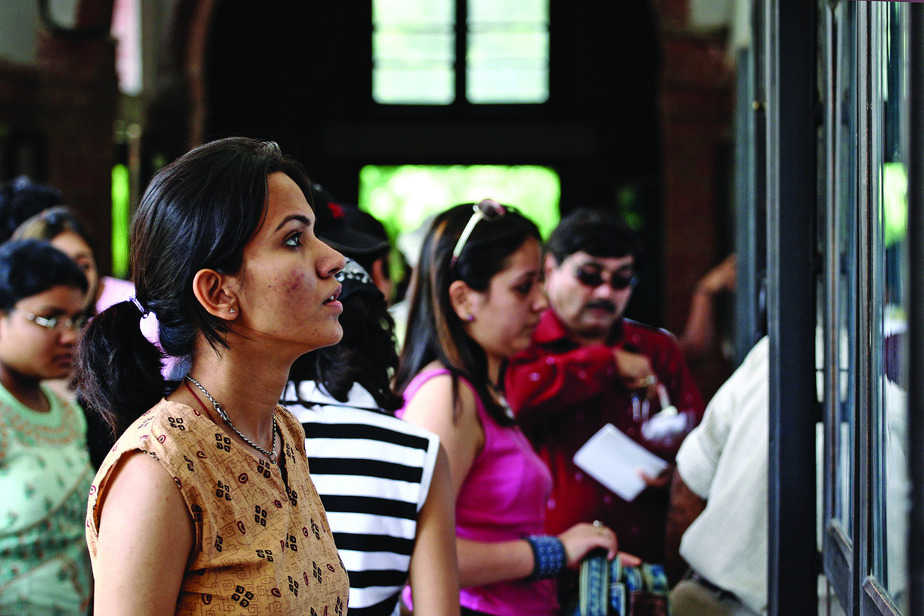With most colleges closing admissions for sought-after courses in the second cut-off list, even high achievers are left with few choices
After the release of the second cut-off list on June 25, students hoping to get into Delhi University are not left with many choices beyond courses like Sanskrit and Philosophy. Delhi University’s first merit-based cut-off list for admissions to undergraduate courses for this year was released on June 18, setting high standards for aspirants.
For students who have slogged but could not score above 95 per cent in class 12 Board exams, reality hit hard that they are not ‘good enough’ for top tier colleges of Delhi University. A total number of 2,78,544 applicants registered for nearly 56,000 seats at the University. Even high achievers will not get the opportunity to pursue their areas of interest in colleges of their preference.
A report states a total of 12,737 students across the country have scored 95 per cent and above in this year’s CBSE class 12 exams. A whopping 2,646 more students than last year have achieved such high percentages in these exams. Even after scaling the heights of academic excellence, they may not get to study in Delhi at all and will be forced to look for alternatives. The reason for this, perhaps, lies in the vast pool of students with high scores aiming for elite colleges. It is these colleges that impose high merit requirements where students with even a 95 per cent struggle to make it.
Amongst the prestigious colleges in DU, Lady Shri Ram College had laid down a minimum requirement of 98.5 per cent for admissions into this year’s BA programme in its first cut-off list. Merit requirement for courses like Economics and Psychology had in fact increased by a value of 0.25 per cent in comparison to last year’s cut-offs.
However, the significance of such marginal increases was also heightened with the excessive demand for a limited supply of seats at an institution that is much coveted. Admissions for students belonging to the ‘general’ category have closed for all courses under the Arts stream in the second cut-off released by Lady Shri Ram College for Women. Admissions to only BA programme in the college still remain open with a minimum score of 97.75 per cent.
Ojasvini Trivedi, an aspiring psychology student, talks about a probable reason for fierce competition for admissions in the best colleges of DU. She says, “I applied to DU with an inclination to pursue psychology from LSR. Who wouldn’t want the DU stamp? But after the release of the first and the second cut off, I struggled. These cutoffs aren’t for humans. I’ve finally submitted my papers for admission at Jesus and Mary College because the percentage requirement for JMC was relatively less for almost all courses. It is also a well-known college, so my parents are also happy”. Hindu College, known for Political Science, also increased the minimum marks requirement in this year’s admission. In the second cut-off, it closed admission for its vantage course along with a closure of admissions into History (Hons).
St Stephen’s College wants a minimum 98 per cent for admission into Bachelors in Economics. A minimum of 75 per cent in mathematics has been mentioned as the “rider” or an obligation for admission into the course. Being an autonomous body within the University, Stephen’s not only issues a merit list but also shortlists the students further on the basis of personal interviews. This further limits the scope of admission for many applicants.
For those who were inclined towards a Bachelor’s in commerce and business studies, this year’s cut-offs have been relatively less harsh. Shri Ram College of Commerce (SRCC), one of the most sought after colleges for such students, retained the requisite marks from last year. The second cut-off witnessed a minimal decrease of 0.25 per cent in the merit requirement for pursuing Economics and by 0.4 per cent for admissions into Bachelors of Commerce.
Arjun Verma, a former student of The Shri Ram School, Aravali, comments, “Each year the cut-offs are higher. It’s not surprising any more. Thankfully, they are more realistic than the last 2-3 years. With a 91 per cent score, I can only hope I get into a good college. As a Commerce student, my only alternative is studying for chartered accountancy.”
Even if the colleges have issued subsequent merit lists, the decrease has been almost negligible. Credible institutions like Sri Venkateswara College had prescribed a minimum requirement of 97.5 per cent for seeking admission in BC. With such high number of applicants, the decrease in the requirement in the second cut-off was only impacted by 0.25 per cent. Hindu College has retained the minimum marks for admissions from its first cut off list at 97.5 per cent.
With 25 per cent of the total seats filled after the release of the first cut-off, the scope for admissions is further constricted. The struggle for admission into a credible institution under Delhi University is hard for every applicant. However, the problem of high cut-offs becomes even more excruciating when it comes to students with disabilities, Scheduled Castes/Tribes and even sportspersons.
Such high cut-offs with or without binding requirements simply undermine the perseverance of each student under the Indian education. While it is noted that the high cut-offs are simply a ramification of high marks obtained by a large array of students in Board exams, there exists a pressing need to bring systematic changes in the grading system.
So what’s the solution? A uniform grading system could be a useful way of eliminating the problems of high cut-offs. A standardised test like the GRE which is used by US universities could be conducted by the University for all applicants so that there is less dependence on Board exam results in determining the course and college for students.





